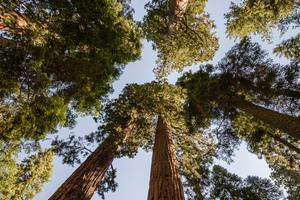In Biodiversity
Forests
-
Murder in Malaysia
How Protecting Native Forests Cost a Southeast Asian Activist His Life
-
Ghost Forests
How Rising Seas Are Killing Southern U.S. Woodlands
-
Video Contest Winner - Runner Up
An Amazon Tribe’s Deadly Fight To Save Its Land From Logging
-
Video Contest Winner - Runner Up
Chocolate in the Jungle: The Battle To Save a Disappearing Rainforest
-
Trouble in Paradise: A Blight Threatens Key Hawaiian Tree
The 'ōhi'a is Hawaii’s iconic tree, a keystone species that maintains healthy watersheds and provides habitat for numerous endangered birds. But a virulent fungal disease, possibly related to a warmer, drier climate, is now felling the island’s cherished 'ōhi'a forests.
-
Deforestation
How Forest Loss Is Leading To a Rise in Human Disease
-
Will Indonesian Fires Spark Reform of Rogue Forest Sector?
Massive fires in Indonesia caused by the burning of forests and peatlands for agriculture have shrouded large areas of Southeast Asia in smoke this fall. But analysts say international anger over the fires could finally lead to a reduction in Indonesia’s runaway deforestation.
-
The High Environmental Cost Of Illicit Marijuana Cultivation
Marijuana growers are ravaging forests in northern California to produce their lucrative crop. In a Yale Environment 360 interview, biologist Mary Power talks about the massive ecological footprint of marijuana growing and why nationwide legalization could help alleviate it.
-
What Lies Behind the Recent Surge of Amazon Deforestation
After declining by more than 70 percent in recent years, deforestation in the Amazon is soaring. In an interview with Yale Environment 360, scientist Philip Fearnside explains what’s driving the clearing of the Amazon and what needs to be done to once again bring deforestation under control.
-
In Kenya’s Mountain Forests, A New Path to Conservation
Kenya’s high-elevation forests are the source for most of the water on which the drought-plagued nation depends. Now, after decades of government-abetted abuse of these regions, a new conservation strategy of working with local communities is showing signs of success.
-
Wood Pellets: Green Energy or New Source of CO2 Emissions?
Burning wood pellets to produce electricity is on the rise in Europe, where the pellets are classified as a form of renewable energy. But in the U.S., where pellet facilities are rapidly being built, concerns are growing about logging and the carbon released by the combustion of wood biomass.
-
At Edge of Peruvian Andes, Tracking Impacts of Warming
The Andes in eastern Peru, with steep slopes and remarkable biodiversity, are what one scientist calls a “perfect laboratory” for studying the effects of climate change. E360 contributor Elizabeth Kolbert trekked there with researchers seeking to determine if tree populations can move uphill fast enough to survive warming temperatures.
-
The World’s Tropical Forests Are Already Feeling the Heat
Much attention has been paid to how global warming is affecting the world’s polar regions and glaciers. But a leading authority on tropical forests warns that rising temperatures could have an equally profound impact on rainforests and are already taking a toll on some tropical species.
-
A Scientist Extols the Value Of Forests Shaped by Humans
Political ecologist Susanna Hecht has incurred the wrath of some conservationists by arguing that the notion of the primeval forest is largely a myth and that disturbed forests play a vital ecological function. In an interview with Yale Environment 360, she makes the case for a “new rurality” that places less emphasis on protected forests and more on the areas where people live.
-
As Larger Animals Decline, Forests Feel Their Absence
With giant tortoises, elephants, and other fruit-eating animals disappearing from many of the world’s tropical woodlands, forests are suffering from the loss of a key function performed by these creatures: the dispersal of tree seeds. But a new experiment shows that introduced species may be able to fulfill this vital ecological role.










